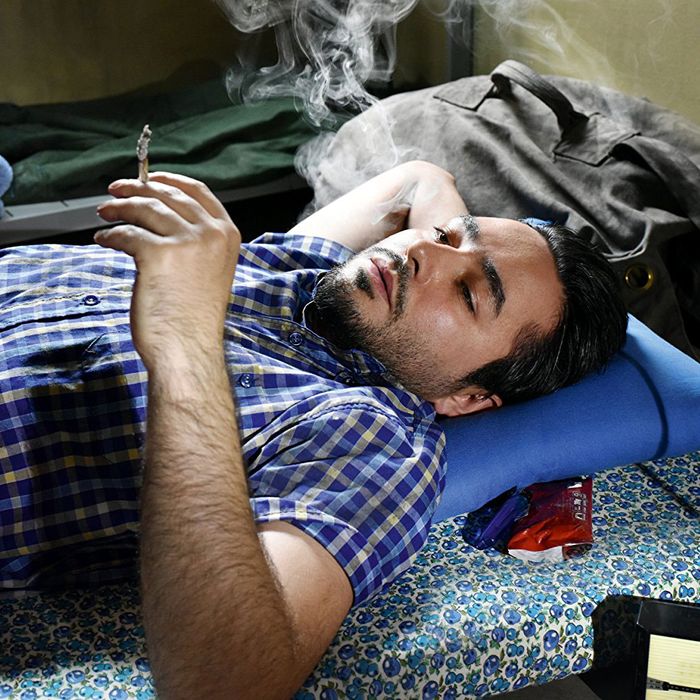New Yorker Review of the Movie the Other Side of Hope
The Other Side of Hope Is Tragic, Funny, Depressing, and Inspiring

Few filmmakers are as drawn to opposites as Aki Kaurismaki, the Finnish master of quirk whose deadpan comic parables leave plenty of space for despair. In his semi-delightful, semi-sad new semi-comedy, The Other Side of Hope, characters in loudly colored clothes handle loudly colored props in pools of light among the general gloom. Scenes of goofy sentiment follow scenes of intense cruelty in a seesaw of bright and grim. Trivial in Kaurismaki'southward films tin be easily reconciled, anymore than you tin reconcile the country-and-western musician with the muddied, deserted Helsinki street on which he's shown strumming his guitar. You laugh considering what else can you practice?
At that place are 2 protagonists in The Other Side of Hope, and they are, of class, total opposites. One is Wikstrom (Kaurismaki regular Sakari Kuosmanen), a reasonably well-off eye-anile salesman (and virtuoso poker player) who leaves his alcoholic wife, sells his company, and buys a rather seedy restaurant that he intends to make into something better. The other is a Syrian refugee, Khaled (Sherwan Haji), for whom tragedies have come up so thick and fast that his life is a sick joke. His parents and most of his siblings died in a bomb strike. He was separated from his surviving sister at the chaotic Turkish border. He was about killed by neo-Nazis in Poland, staying alive only by hiding in a cargo ship spring for Helsinki. Now, in Finland, clearing officials accept decided that he must be forcibly returned to Syria because there is no firsthand threat in his home metropolis. His home city is Aleppo.
Hither is how Kaurismaki works. Having escaped from immigrant'southward prison simply now hunted by racist thugs, Khaled lies in an alley, where Wikstrom — bringing out the trash from his eating place — finds and has words with him. A fight ensues and Khaled decks the bigger but older man. In the adjacent scene, the hungry Khaled is being fed within the eating house while Wikstrom marvels at the man's right hook. How easily Wikstrom could have phoned the police force, leading to more than woe. Just Kaurismaki writes like those improv performers who are told never to say no to another onstage because that would prevent futurity avenues — however cool-seeming — for exploration. It'south far more than fun to take Wikstrom — no stranger to misfortune — to bring Khaled in, mensurate him for a uniform, pay for a simulated ID, and permit him sleep in a food-storage room. Merely just when you recall, "What a nice, sentimental fiddling one-act," misfortune is apt to rear its head.
The central department of The Other Side of Hope suggests that you can indeed keep going, by despair, and come up dorsum around to hope. The restaurant's somewhat sullen employees — each with his or her own problems simply who respect their new possessor's good intentions — farcically hide Khaled from health inspectors. They participate in a screamingly funny — and disastrous — attempt to plough the identify into a sushi restaurant. They lend their back up when Khaled returns to his most vital mission: finding his sister.
The story of Khaled could take been told in the harshest way possible — and information technology is, elsewhere. The documentary Last Men in Aleppo shows immature men merely like him burrowing in rubble and finding bodies of women and children. But not enough people will run across Last Men in Aleppo because, well, who wants to look at pictures of expressionless children? (We volition, but we don't want to.) A movie like The Other Side of Hope — which is tragic, funny, depressing, and inspiring — shows that a truly imaginative artist has resources unavailable to journalists and nonfiction filmmakers. In Kaurismaki's work, it's as if the masks of one-act and tragedy don't — as usual — face away from each other, but stare each other in the face, as if they were saying, "You and me, nosotros're in this together."
Source: https://www.vulture.com/2017/12/the-other-side-of-hope-review.html
Posting Komentar untuk "New Yorker Review of the Movie the Other Side of Hope"